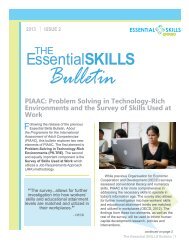Uncharted Territory - Essential Skills Ontario
Uncharted Territory - Essential Skills Ontario
Uncharted Territory - Essential Skills Ontario
Create successful ePaper yourself
Turn your PDF publications into a flip-book with our unique Google optimized e-Paper software.
CAN SOCIAL INNOVATIONS HELP LES PROGRAMSACHIEVE GREATER SOCIAL IMPACTS?5.1 Creating the conditions for social innovation in LESTo create the conditions for innovative solutions to complex problems, wemust ask the right questions to identify the exact nature of the problem weare trying to solve, as well as distinguish whether the problem is solely amatter of low LES levels or of complex social issues (unemployment, socialassistance and family sustaining wages) where LES is one component of amore complicated challenge. Only by asking and answering such questionscan the LES field arrive at an agreement about what we are trying to achieveand create the necessary conditions for social innovation to produce resultsthat matter.Once there is agreement on what we are trying to address, the next step is toagree upon what we believe LES programming can achieve in terms of actualstudent outcomes and social impacts. Beyond that, to cultivate anenvironment for social innovation, we might consider “innovations” inexisting program design. Among the most important would be a moreintegrated systems approach which, as noted by Leadbeater aboutinnovations in education, is less likely to be unique and more likely to beachieved by combining elements of existing approaches in our currentemployment and training system. There are numerous examples of successfulalternatives which borrow elements from several approaches and havepersuasive data about potential effectiveness. These are not just “socialinnovations”, but innovations in program and system design that usesubstantive participant data to determine effectiveness and inform programimprovement. We need to look at the results of these various approacheswith a view to borrowing from the best (i.e. most demonstrably successful) tocreate the “new”. The founders of Pathways to Education recognized thatthey were not developing new programs, but were developing an innovativeapproach – one that took isolated services and supports and blended them ina manner that made all programs accountable to the community (Acker andRowen, Forthcoming 2012).Former <strong>Ontario</strong> Deputy Minister Ben Levin noted that there is a tendency toblame others for a situation of malaise and lack of effectiveness and toassume that someone else has to change before anything new can emerge(2004). LES stakeholders should perhaps consider what changes we need tomake to ensure the effectiveness of our work - without predicating thosechanges on what others (i.e. governments and business) must do first. Whileit is undoubtedly true that any new approach will require someone else totake a risk, it is perhaps more important that the LES field acknowledge theneed to take some risks, to leave behind the comforts of conformity, andboldly address the many needs which call for social innovation.26 • <strong>Uncharted</strong> <strong>Territory</strong>: Can Social Innovation Revitalize Literacy and <strong>Essential</strong> <strong>Skills</strong> Programs?




